What are the pros and cons of speech therapy settings for my child (in home, at a clinic, in a hospital or at a university)?
(Bonnie R, mom of 6 year old boy with an articulation disorder)
First of all, keep in mind that the rapport between the speech language therapist and your child is the most important element whether it’s in your home, at a clinic or in a hospital or university setting.
Secondly, the disorder that your child may have and the severity will also dictate your choice.
Finally, convenience, cost and payment options will also likely influence your decision.
That said, I put together the pros and cons of speech therapy settings to help you with your decision.
- Schools
- Private Practice – In home
- Private Practice – Clinic
- Hospital
- University
Pros and Cons of Speech Therapy in Schools
-
Pros
- Cost
- Eligible kids receive services free under the Individuals with Disabilities Education Act (IDEA).
- Reach out to the state at CONNECT Helpline at 1-800-692-7288 to determine eligibility requirements and get a referral to your county administrators.
- Convenience
- The therapy happens at the school during school hours.
- Team Approach
- The educators and the SLP can work together to link the curriculum to the special needs of the student.
- Cost
-
Cons
- High Case Loads:
- School SLPs carry heavy caseloads. This often makes focused individualized therapy difficult to do.
- Often school SLPs resort to group therapy sessions.
- Groups can be beneficial if kids are paired with other kids who have similar issues and who are developmentally and socially compatible. This is not always the case.
- Therapy Interruptions:
- The school schedule with multiple long breaks leads to long interruptions in therapy.
- Specific Expertise:
- The school SLP might not have experience or expertise to treat the specific speech or language disorder that your kid has.
- Missed Classes:
- Kids are pulled out of class for therapy which can have consequences both academically and socially.
- High Case Loads:
Pros and Cons of Speech Therapy at Home (Private Practice)
-
Pros
- Flexible Schedules:
- SLPs typically offer very flexible hours.
- Potentially Cost:
- Eligible kids ages 0 to 5 are provided services free under IDEA.
- Reach out to the state at CONNECT Helpline at 1-800-692-7288. If your child is eligible, the state or county will send your case to an agency and the agency will typically send a contract SLP to your home.
- Convenience:
- The therapy happens in your home on your schedule.
- Team Approach:
- The SLP can work with you and your entire family.
- Individualize Attention:
- 1 on 1 therapy sessions.
- Flexible Schedules:
-
Cons
- Insurance:
- Many small private practice SLPs do not accept insurance leaving you to pay upfront and do all of the insurance filing.
- NOTE: Kidmunicate is a preferred provider for Blue Cross Blue Shield and accept all of their private plans including: Personal Choice, Independence, Highmark, Horizon, Anthem, Premier Blue and others.
- Distractions:
- The home is filled with visual and sound distractions that can hamper a session.
- Access to Materials:
- Successful SLPs use a variety of materials, tools and props in therapy sessions. At Kidmunicate we have a room with shelves floor to ceiling filled with these materials. It’s not practical for traveling SLPs to bring all of their materials on the road, so the perfect prop or game might not be readily available.
- Insurance:
Pros and Cons of Speech Therapy at a Clinic (Private Practice)
-
Pros
- Flexible Schedules:
- Kidmunicate accepts appointments 8:30 to 6:30 and by special appointment on Saturday mornings.
- Access to Materials:
- SLPs have immediate access to all of the materials, tools and props needed for a successful therapy session.
- Individualize Attention:
- Clinics give the parent the choice of small well-paired groups or individual therapy.
- Resources:
- Many clinics have access to a coordinated team of therapists (speech, occupational, behavioral, etc.)
- Kidmunicate has a behavioral therapist on staff and strong relationships with OT, PTs and developmental pediatricians. A multi-disciplined team can be assembled if needed.
- Limited Distractions:
- Therapy rooms are often devoid of distractions.
- Check out the therapy rooms at Kidmunicate, including the sensory room, the feeding room and the therapy room with an observation window.
- All the rooms are kid friendly and free of distractions so the student can focus on the therapy.
- Flexible Schedules:
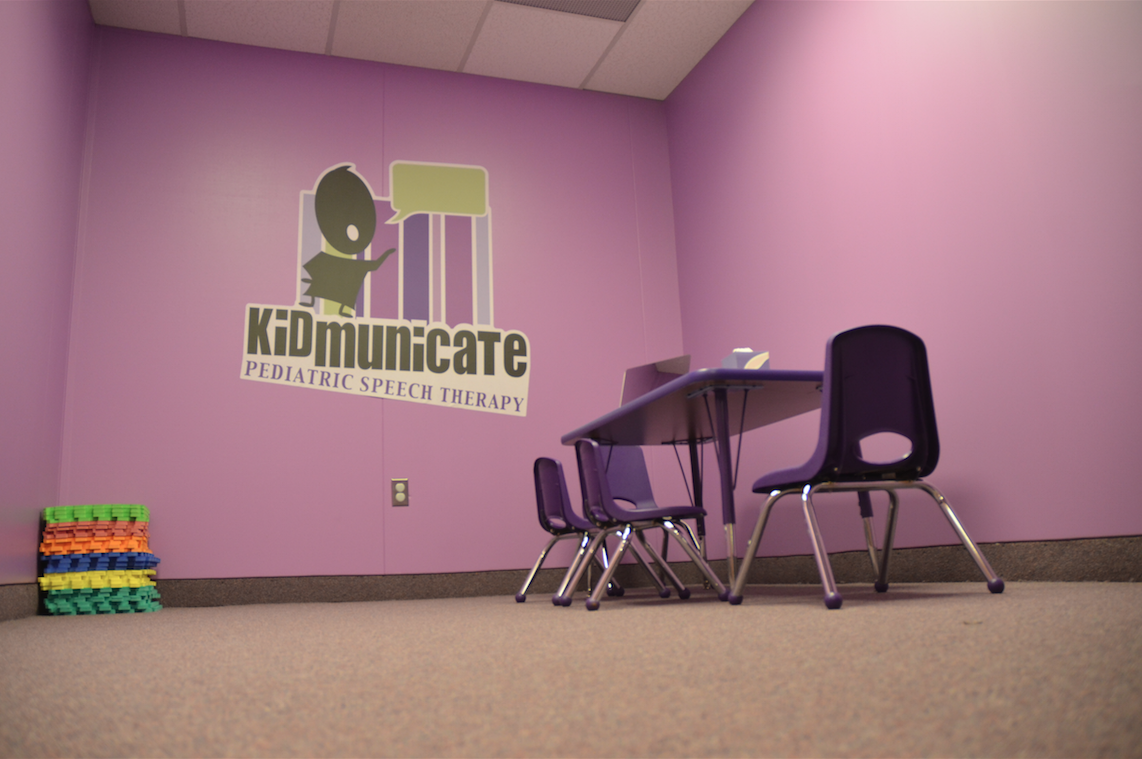
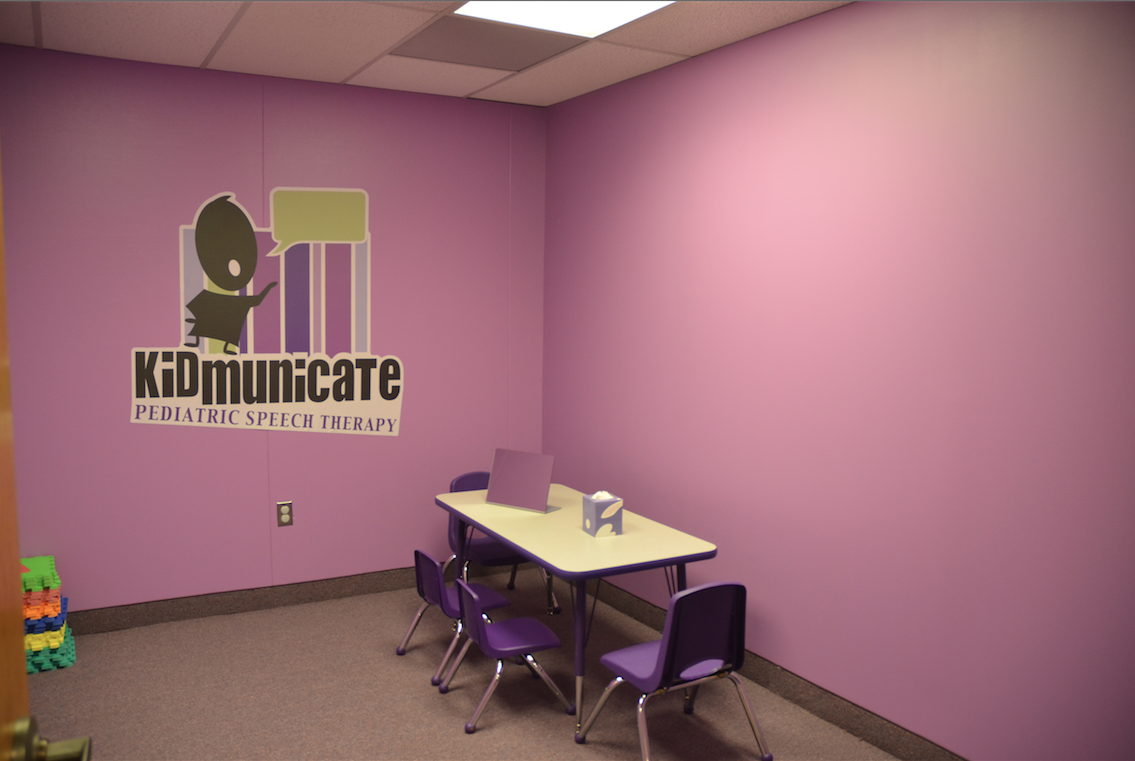
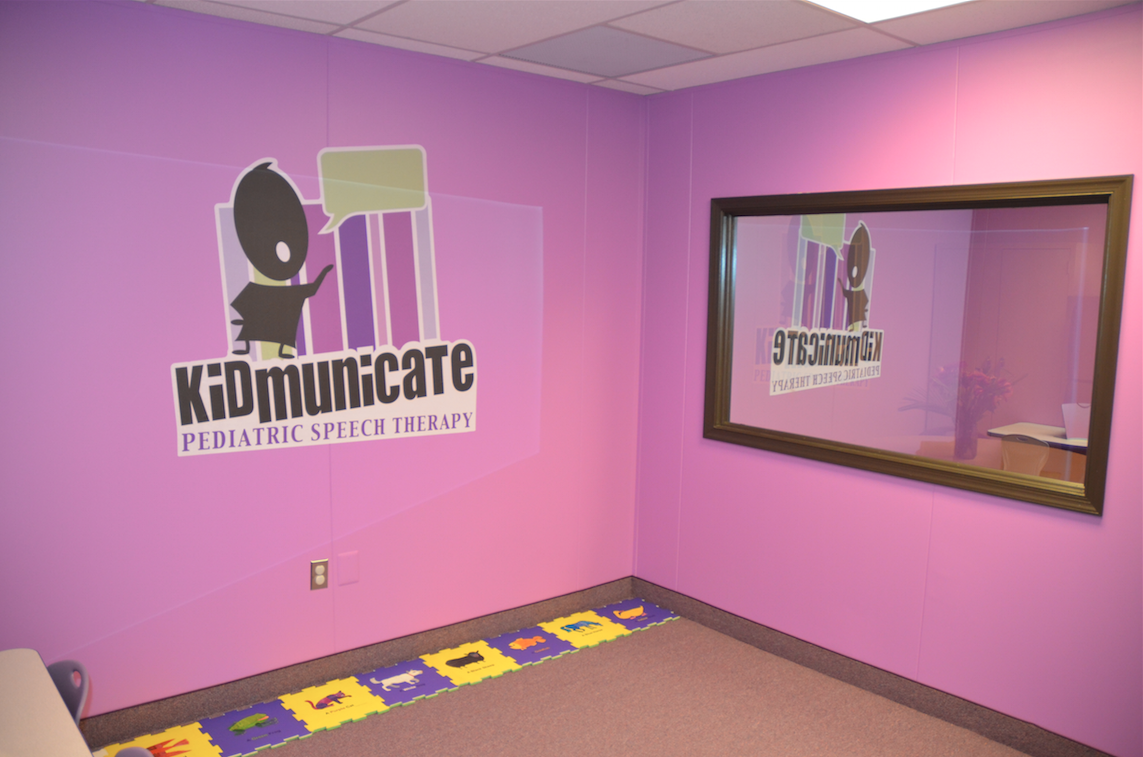
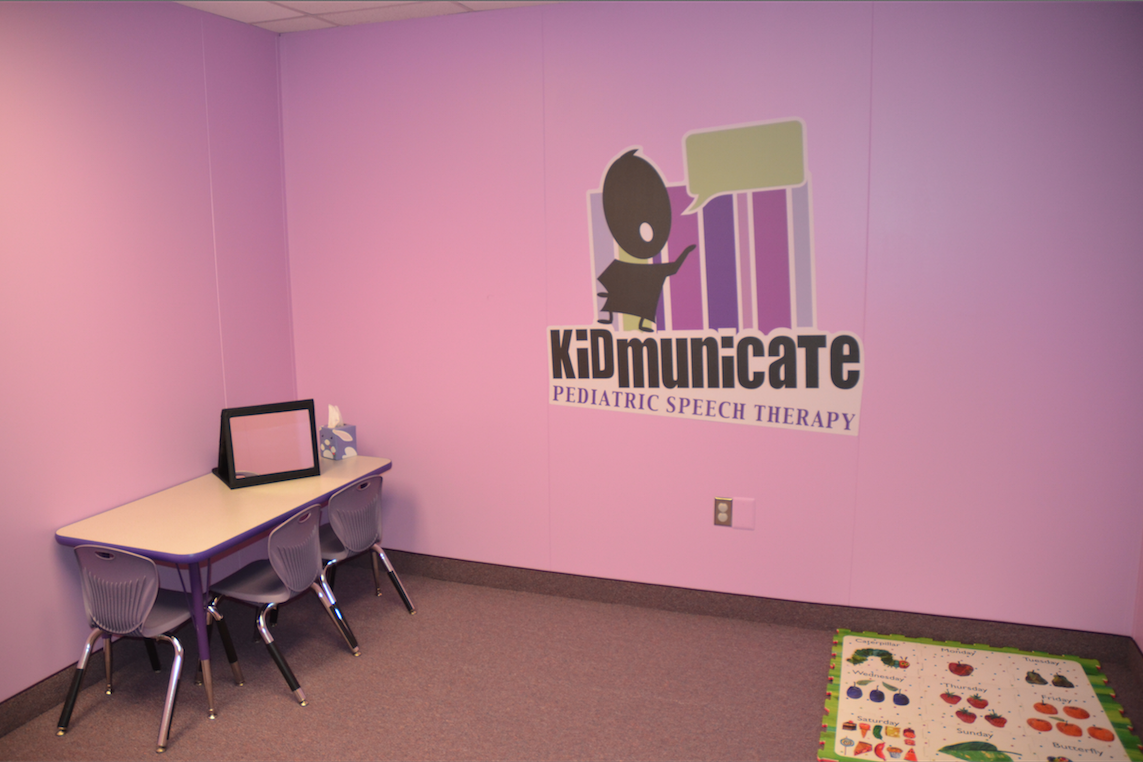
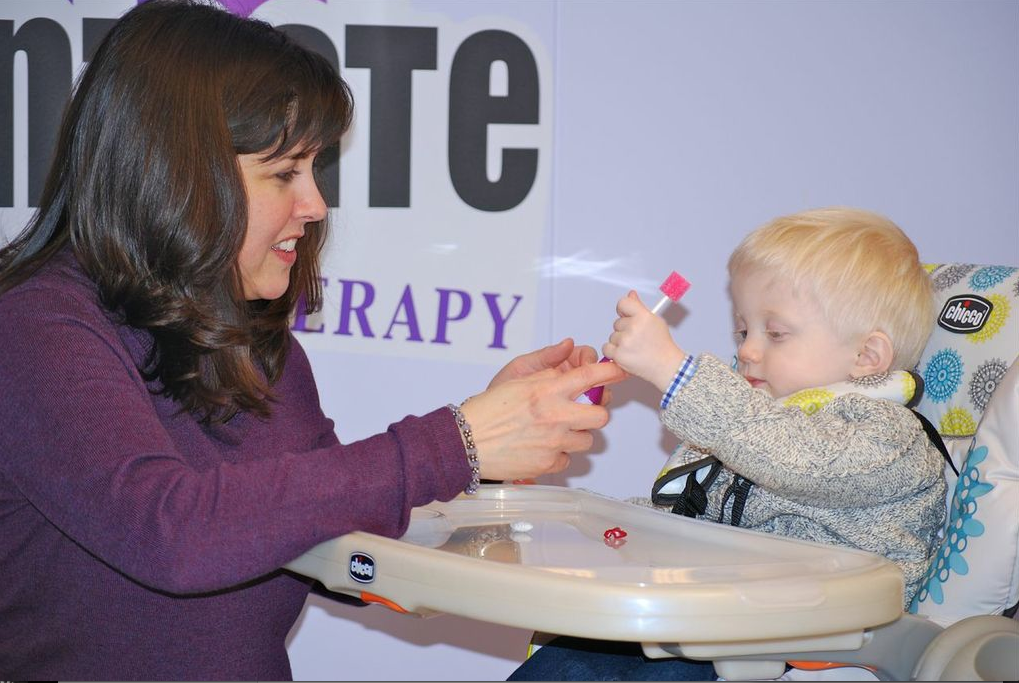
-
Cons
- Insurance:
- Like in-home private practice SLPs, many small clinics do not accept insurance leaving you to pay upfront and do all of the insurance filing.
- NOTE: Kidmunicate is a preferred provider for Blue Cross Blue Shield and accept all of their private plans including: Personal Choice, Independence, Highmark, Horizon, Anthem, Premier Blue and others.
- Continuity of Care
- Large Clinics often have rotating SLPs.
- Kidmunicate strives to provide a dedicated SLP for each child.
- Inconvenience Factor
- The parent needs to drive to the clinic.
- Insurance:
Pros and Cons of Speech Therapy at Hospital
-
Pros
- Resources
- Hospitals have access to the most resources and state of the art diagnostic tools. This is especially important for complex cases, but less important for more straightforward cases.
- Access to a coordinated team of therapists (SLPs, OT, PT and Behavioral, etc.)
- Large staff
- It is likely that the hospital will have a speech language therapist specifically trained for your child’s particular disorder.
- Insurance
- Hospitals have the resources and expertise to handle the insurance claims.
- Individualize Attention:
- Hospitals provide very thorough individualized treatment.
- Limited Distractions:
- Therapy rooms are often devoid of distractions.
- Resources
-
Cons
- Waiting List:
- Top Children’s Hospitals often have long waiting lists.
- Scheduling
- There is a high demand for the coveted after school hours.
- Continuity of Care:
- Scheduling is tough, so your child might not get the same therapist each time.
- Inconvenience
- The parent needs to drive to the hospital and deal with hospital parking.
- Waiting List:
Pros and Cons of Speech Therapy at a University
-
Pros
- Cost:
- Universities often reduce the cost for therapy services because therapy is conducted by supervised students.
- Resources
- Universities have SLP professors and researchers with PhDs who keep up with the latest treatment options.
- The student clinicians have access to the latest equipment, technologies and assessment tools to provide comprehensive evaluations.
- Cost:
-
Cons
- Experience:
- Although Student clinicians are supervised, they are not licensed speech pathologists yet.
- Student clinicians lack experience.
- Continuity of Care
- Student clinicians tend to rotate in and out every semester, so your child may get a new SLP every couple of months.
- Rotating SLPs cannot develop a strong rapport with teachers, developmental pediatricians, OTs and PTs when a team approach is needed.
- Inconvenience
- The parent needs to drive to the university and deal with university parking.
- Experience:
Click Here to contact us to schedule a visit
If you have any observations that you want to add to the list of the pros and cons of speech therapy settings, please comment below and I will add them.


Why list expertise as a con for school SLPs?? All SLPs have the same training and degrees. School settings often consist of diverse populations of diverse needs, and school SLPs are just as skilled as SLPs in other settings!
The point we were trying to make is that some SLPs have developed a specific expertise and established a reputation dealing with a specific disorder. For example, we have an SLP with a great reputation in dealing with children who have fluency issues.
We did not mean to demean school based SLPs. We work in partnership with many wonderfully skilled school based SLPs every week. Thanks for pointing out this, I have changed the heading to Specific Expertise.
Now that my son is turning six years old, I want to consider getting him into comprehensive speech therapy at home. Aside from the benefit of individualized attention given to my kid during the session, I like that therapists offer a flexible schedule, which is convenient for me and my kid since he needs to still go to school. With that considered, I am hoping to find one who’s willing to help my child develop his speaking skills.